The November 2014 Retail Sales report shows retail sales increased 0.7% for the month. This is when gasoline prices have plunged, pulling down retail gas sales. October retail sales were revised upward by 0.2 percentage points to a 0.5% increase. Retail sales have now increased 5.1% from a year ago. November's increase was due to auto sales, although other retail sales categories increased. Without autos & parts sales, retail sales still increased 0.5%. Retail sales are reported by dollars, not by volume with price changes removed.

Retail trade sales are retail sales minus food and beverage services and these sales increased 0.7% for the month.. Retail trade sales includes gas.
Total retail sales are $449.3 billion for November. Below are the retail sales categories monthly percentage changes. These numbers are seasonally adjusted. General Merchandise includes super centers, Costco and so on.
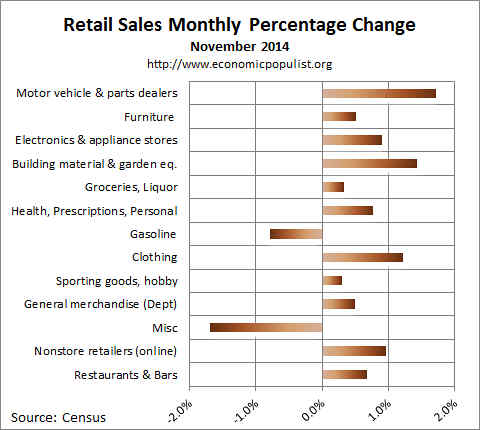
Below is a graph of just auto sales. Kind of amazing, but motor vehicle sales have increased 9.5% for the year. Autos have been going strong for some time now.
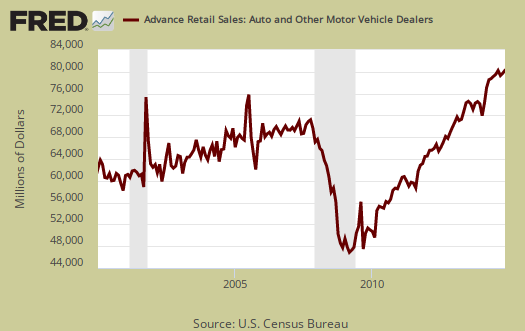
Below are the retail sales categories by dollar amounts. As we can see, autos rule retail sales. We also see online retailers continue to expand.
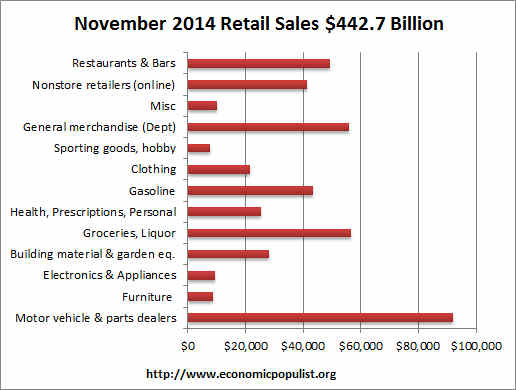
Graphed below are weekly regular gasoline prices, so one can see what happened to gas prices in November. Believe this or not, but gasoline station sales are down -2.1% from a year ago.

The below pie chart breaks down the monthly seasonally adjusted retail sales by category as a percentage of total November sales by dollar amounts. One can see how dependent monthly retail sales are on auto sales by this pie chart. We also see non-traditional retailers making strong grounds on traditional general merchandise stores and almost equal to gasoline sales in terms of importance.
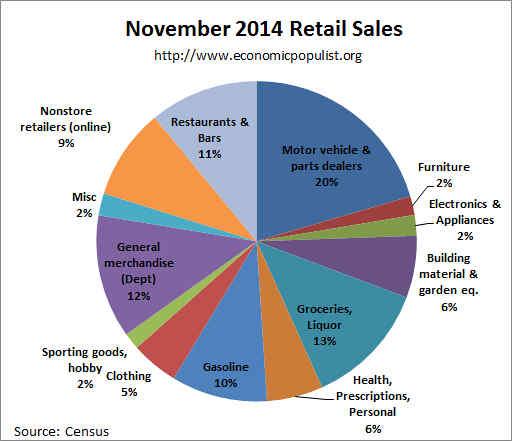
Retail sales correlates to personal consumption, which in turn is about 70% of GDP growth. Yet GDP has inflation removed from it's numbers. This is why Wall Street jumps on these retail sales figures. Below is the graph of retail sales in real dollars, or adjusted for inflation, so one gets a sense of volume versus price increases. Below is the annualized monthly percentage change in real retail sales, monthly, up to October 2014. This is a crude estimate since CPI is used instead of individual category inflation indexes. The below graph can give some insight as to what consumer spending might shape up to be for Q4 2014.
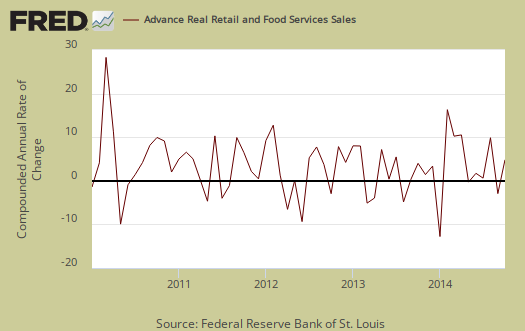
Below is a graph of real PCE against real retail sales, quarterly, up to Q3. See how closely the two track each other? PCE almost looks like a low pass filter, an averaging, removal of "spikes", of real retail sales. Here are our overviews for PCE. Here are our overviews of GDP.
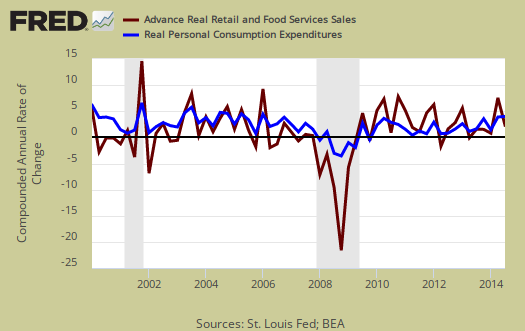
Retail sales are not adjusted for price increases, not reported in real dollars. Real economic growth adjusts for inflation. Retail sales has variance, margins of error, and is often revised as more raw data comes into the U.S. Department of Commerce (Census division). For example, this report has an error margin of ±0.5%. Data is reported via surveys, and is net revenues of retail stores, outlets. Online retail net revenues are asked in a separate survey of large retail companies (big box marts). This is also the advanced report. To keep the monthly nominal percentage changes in perspective, below is the graph of monthly percentage changes of retail sales since 2008.
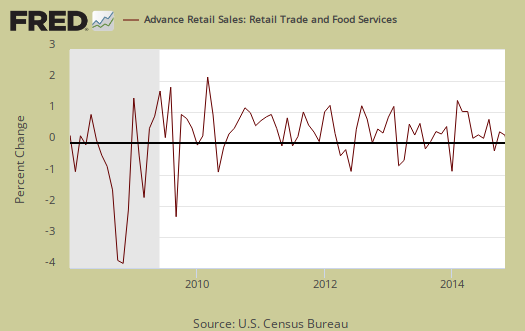
For the three month moving average, from September to November in comparison to the June through August average, retail sales have only increased by1.0%. Gasoline looks like the culprit still as the bottom has fallen out of prices. ;The retail sales three month moving average in comparison to a year ago are up 4.7%. Overall as shown the below graph of quarterly annualized retail sales percentage change, up to Q3 2014. &nsp;We believe gas prices have much to do with things.
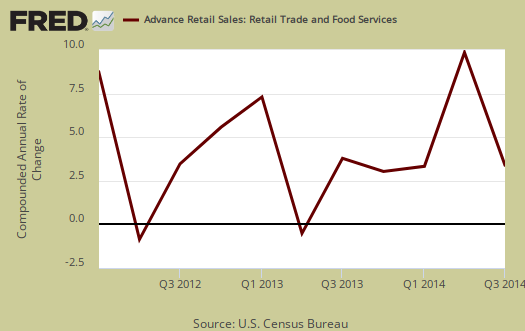
Seasonal adjustments are aggregate and based on events like holidays associated with shopping, i.e. the Christmas rush. Advance reports almost always are revised the next month as more raw sales data is collected by the Census. In other words, do not get married to these figures, they will surely be revised. With that, Zerohedge reports November's seasonal adjustment is the 2nd largest in history. We note that gas prices were collapsing at the last large seasonal adjustment in November retail sales. Here is our retail sales topic category.
Here are past retail sales overviews, unrevised.

seasonal aberration
there's something odd about the seasonal adjustment in this report, which has been called out on Zero Hedge and on MarketTicker; my own quick calc show sthe year over year adjusted sales increase is +5.13%, while the unadjusted YOY increase is just 3.36%...last i checked, November was in the same season this year as last..
here's market ticker:
http://www.market-ticker.org/akcs-www?post=229652
rjs
I linked to ZH seasonal adjustment retail sales comment
I'm not so sure in that I am thinking the drop in gas prices has something to do with the seasonal adjustment here. It's very high but it has been higher and one would think it would have been readjusted by now if it was really such an error...
unless of course we all believe D.C. is simply the Bureau of Lies, which,well...
;)
sorry, i missed that
sorry, i hadnt read your post to the end before i rushed to comment... and no, i dont buy the "bureau of lies" headline that karl denninger used, just that i thought his detailing or the year to year differences was pretty impressive...from what i've read about seasonal adjustments, they're generally based on the last five years of data, or at least somewhat more heavily weighted towards more recent seasonal results...thus the data for 2013 would have been adjusted in part using the recession years of 2008 and 2009, whereas the adjustment for 2014 would include the stronger sales of 2013...that could account for a large part of the discrepancy, without any conspiracy on anyone's part..
rjs
Cheap Gas: Good or Bad?
Fox News on cable TV today @ 10:30 am PST -- They say stocks are faltering because of low oil prices (because the global economy is slowing), and that this may be taking a bite out of our 401ks and pensions — and that U.S. oil producers may cut back, affecting jobs.
* Question: So are we damned either way — with either low oil prices or high oil prices?
Fox Business (last month) "With new technology such as hydraulic fracturing (fracking), the U.S. has been able to access large deposits of oil and natural gas that were previously unusable. Seemingly overnight, the U.S. has gone from one of the largest energy importers to one of the world’s largest energy producers. This has helped the U.S. to be less dependent on foreign energy sources as well as create thousands of new jobs. In addition, we can enjoy very low energy costs compared to almost anywhere in the world."
http://www.foxbusiness.com/personal-finance/2014/11/27/what-baby-boomers...
* Question: So what good is cheap and abundant oil if we get cheap gasoline for our cars and cheap heating oil for our homes, but then our retirement plans get screwed? Is “energy independence” a BAD thing because the oil companies operate for profit? Shouldn’t the energy companies be nationalized — and oil and gas be sold to U.S. consumers “at cost”?
(2 months ago) "Fox News has officially criticized Obama for making gas prices too cheap. It marks the first day in which Fox News hasn’t criticized Obama for making gas prices too expensive."
http://www.addictinginfo.org/2014/10/28/fox-news-jumps-the-shark-now-bas...
details on October retail revisions
looking at the revisions to October sales in this month's report and comparing them to the table from the advance report for October sales as released last month, we find that a large factor in the revision of October's sales from an increase of 0.3% to an increase of 0.5% was the revision of sales of motor vehicles and parts, from the previously reported increase of 0.5% to an increase of 0.8%, with car dealers specifically seeing a 0.9% increase; but even so, October's sales without automotive sales are still now up 0.5% vs the previously reported 0.3% increase..other retail businesses seeing sizable upward revisions to last months sales included the miscellaneous store category, where October sales were revised from an increase of 0.5% to a 1.3% jump, sales at specialty stores, ie, sporting goods, book and music stores, which have been revised from an increase of 1.2% to an increase of 1.8%; sales at electronic and appliance stores, which were revised from a drop of 1.6% to a decrease of 1.0%, sales at restaurants and bars, who saw sales rise 1.4% rather than the 0.9% first reported, and sales at furniture stores, which were revised from the original 0.2% gain to an increase of 0.7%...meanwhile, sales at drug stores increased by just 0.2%, not the 0.7% first reported, while October sales at non-store retailers were revised down from a 1.9% jump to an increase of 1.6%...
rjs
auto sales
I guess they have a long way to increase since auto sales imploded in 2008, but still how long can this go on?
top of the cycle
bill mcbride's graph shows the recent history, and it looks like auto sales are peaking again, though it may have another year or so...
http://www.calculatedriskblog.com/2014/12/us-light-vehicle-sales-increas...
from an auto town, i've watched this boom bust cycle all my life, never could figure out why everyone goes out & buys new cars at the same time every six / eight years
rjs
real retail sales higher...
in November, energy commodities were 6.4% lower while food prices rose 0.2% mostly on a 0.4% increase in food away from home...meanwhile, the composite of all commodities less food and energy commodities fell by 0.4%, so the deflator for most of retail sales other than food will be a large negative...
rjs